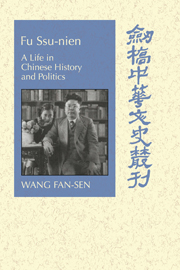Book contents
- Frontmatter
- Contents
- Acknowledgments
- List of Abbreviations
- Chronology
- Introduction: Fu Ssu-nien and Post-1895 Intellectual Trends
- 1 Fu Ssu-nien's Early Years
- 2 The Shaping of a New Historical School
- 3 Toward a Theory of Plural Origins of Chinese Civilization: Hypotheses on Ancient Chinese History
- 4 Contra-Introspective Moral Philosophy
- 5 The Burden of the May Fourth Mentality
- 6 Statism and the Later Days of a May Fourth Youth
- Conclusion: The Defeat of a May Fourth Youth
- Appendix I A Fragment from a Short Story Attacking Ku Chieh-kang
- Appendix II A Transcript of a Conversation between Fu Ssu-nien and Ch'en Pu-lei
- Glossary
- Bibliography
- Index
Conclusion: The Defeat of a May Fourth Youth
Published online by Cambridge University Press: 01 February 2010
- Frontmatter
- Contents
- Acknowledgments
- List of Abbreviations
- Chronology
- Introduction: Fu Ssu-nien and Post-1895 Intellectual Trends
- 1 Fu Ssu-nien's Early Years
- 2 The Shaping of a New Historical School
- 3 Toward a Theory of Plural Origins of Chinese Civilization: Hypotheses on Ancient Chinese History
- 4 Contra-Introspective Moral Philosophy
- 5 The Burden of the May Fourth Mentality
- 6 Statism and the Later Days of a May Fourth Youth
- Conclusion: The Defeat of a May Fourth Youth
- Appendix I A Fragment from a Short Story Attacking Ku Chieh-kang
- Appendix II A Transcript of a Conversation between Fu Ssu-nien and Ch'en Pu-lei
- Glossary
- Bibliography
- Index
Summary
The fall of modern China from its position (at least in its own eyes) as the center of the civilized world to its new low as the most humiliated, hurt, and frustrated nation on earth produced festering nationalistic feelings. In the name of patriotism, a nationalist can bounce back and forth between conservatism and radicalism, between right-wing fanaticism and left-wing extremism. For such a figure, beneath the swift current of massive and unexpected change, patriotism is always the ultimate moving force.
This was especially true for Fu Ssu-nien's thought throughout his life. Born in a most conservative area and raised in a very traditional manner, Fu was expected to be a transmitter of traditional Chinese learning. Fu's surprise switch to the New Culture group in 1918 was mostly motivated by strong patriotic feelings and his search for an effective medicine to cure the nation's ills. Fu's patriotic enthusiasm expressed itself not by glorifying China's past, but through self-reproachment. His cultural iconoclasm was so thoroughgoing that he claimed that only Western learning could be called learning, whereas Chinese tradition should be completely discarded. But in his innermost self, he was torn between two extremes. He called for the complete abandonment of that with which he was most familiar and criticized the things with which he had previously been the most at ease. Dilemmas, discrepancies, and contradictions are evident in Fu's mind and writings.
- Type
- Chapter
- Information
- Fu Ssu-nienA Life in Chinese History and Politics, pp. 197 - 204Publisher: Cambridge University PressPrint publication year: 2000



